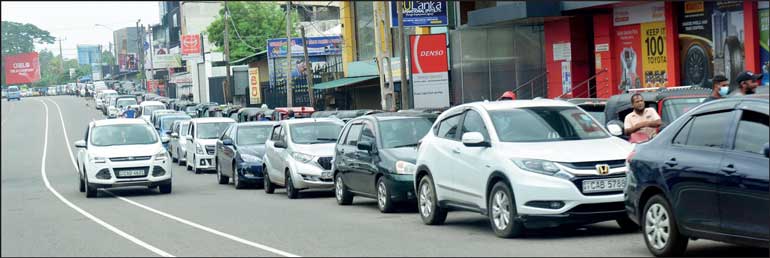Tuesday Feb 17, 2026
Tuesday Feb 17, 2026
Friday, 24 June 2022 00:13 - - {{hitsCtrl.values.hits}}

Other countries with the same problem as ours, have already and correctly identified the need to control inefficient private vehicles in order to manage their fuel consumption, environmental pollution and road congestion - Pic by Ruwan Walpola
 Our fuel crisis runs deep. What we see on the surface are shortages at the pump but the problem is bigger than that. What really ails our system are the purchases on the spot market, which means we cannot cushion against price volatility. We have made ourselves unhealthily dependent on imported fuel which is a direct result of our unsustainably high fuel consumption. Nor do we have adequate foreign exchange for forward-purchasing or stockpiling, methods used by many countries to ease the impact of a rapid price increase, and allow their economies to bear such increases gradually.
Our fuel crisis runs deep. What we see on the surface are shortages at the pump but the problem is bigger than that. What really ails our system are the purchases on the spot market, which means we cannot cushion against price volatility. We have made ourselves unhealthily dependent on imported fuel which is a direct result of our unsustainably high fuel consumption. Nor do we have adequate foreign exchange for forward-purchasing or stockpiling, methods used by many countries to ease the impact of a rapid price increase, and allow their economies to bear such increases gradually.
We are experiencing similar price hikes right now. Oil prices have edged up on high summer fuel demand while supplies remained tight because of sanctions on Russian oil after its invasion of Ukraine. The oil demand is expected to increase further with the reopening of China after the pandemic lockdowns. We need to think of a $ 4 billion spend on fuel for road transport alone if we have to go by consumption figures of the pre-pandemic times in Sri Lanka.
As seen from past experience, spikes in global oil prices can last up to 3-4 years, for example, the global economic crash in 2009 and the period that followed. With our current high dependence on imported fuel, the international price shocks will undoubtedly have a severe impact on our already failed economy.
If we are to stop this decline in the tracks we need to rethink our fuel consumption and look at ways to become fuel efficient without losing productivity or convenience. How can we achieve this?
Around 76% of our fuel consumption for transport is in passenger travel. 51% of that is used by cars, pick-ups, and SUVs, while 31% is by motorcycles and three-wheelers. Public transport which includes 59,000 buses and private coaches (25,000 private and SLTB buses) carrying half the passengers, consumes only 514 million litres of diesel or 17% of the fuel used for passenger mobility. The railway which transports 5% of passengers takes up the other 1%.
The train is the most fuel-efficient mode of passenger transport in Sri Lanka. It is 8-9 times more fuel-efficient than an average car, while the bus is 6-7 times more efficient. Amongst private transportation the most efficient is the motorcycle yet it is three times less efficient than a bus. Large private vehicles over 1,500 cc, unless they are hybrid or electric, are the heaviest fuel users. In a fleet of over 1 million passenger cars, pick-ups and SUVs, we have only 5,000 or less electric vehicles and some 200,000 hybrid vehicles. This means over 80% of our cars, pick-ups and SUVs are not fuel efficient. Other passenger vehicles, which make up 4 million, use only diesel or petrol.
Other countries with the same problem as ours, have already and correctly identified the need to control inefficient private vehicles in order to manage their fuel consumption, environmental pollution, and road congestion. Sri Lanka needs to urgently follow suit; and the beginning of identifying and minimising the problem is bringing about a policy option or in Sri Lanka’s case, more of a policy reversal. If Sri Lanka were to implement Singapore’s policy of improving public transport which is one of the most convenient and does 85% of all trips, we would be able to reduce 1,200 million litres of fuel, which is 42% of the fuel used for passenger transport. At today’s fuel prices, our savings would be $ 120 million per month or around 2-3 shiploads (40,000 MT) of fuel per month. Since better public transport means less demand for road space, we can reduce a further $ 100 to $ 200 million per month, by not having to build new roads, and at the same time reduce road congestion.
Be that as it may, while improving our public transport is a necessity, there are more immediate measures that can be used to reduce consumption in the short term. One, is to reduce the number of private vehicles on the roads, by allowing odd/even number plate vehicles to travel on the roads on alternate days. This can be implemented for three months and enforced on all cars, SUVs, double cabs, and motorcycles. Vehicles such as three-wheelers should be limited to four days a week and one day on the weekend based on the number plate.
Other measures include ride-sharing, travel allowances for government officials instead of vehicles, fuel quota systems for government employees based on the level of importance and nature of job, restricted entry for private vehicles into congested areas of the city; both government and the private sector to develop transportation plans with 25% reduction of fuel consumption; conduct awareness program and free consultations on improving fuel efficiency of vehicles, and introduce a fuel pricing formula where high prices can be cushioned initially but gradually taxed in the medium-term to a predetermined maximum.
Another immediate measure is to do away with the vehicle permit system and if necessary provide tax benefits only for electric vehicles.
(The writer is a transport sector professional with over 35 years of experience in academia, government and consulting. He is a Senior Professor in the Department of Transport and Logistics Management, University of Moratuwa, a Chartered Engineer and a Fellow of the Chartered Institute of Logistics and Transport and Founder President of the Sri Lanka Society for Transport and Logistics. He is a graduate in Civil Engineering from the University of Moratuwa, Sri Lanka. He completed his PhD at the University of Calgary, Canada.)